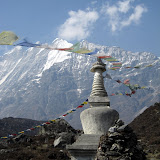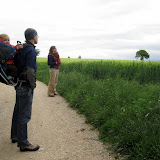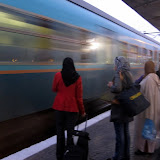I started reading a new book this morning,
A Theory of Justice by John Rawls. It's a pretty weighty political philosophy text--social contracts and such. I read about it online a few days ago, while I was searching for people who had addressed the conundrum of whether and how to tolerate intolerance. I see occasionally reading books along these lines as a part of my attempt to strike a balance between engaging my rational, intellectual side on the one hand and nourishing other, more intuitive forms of knowing on the other.
Traveling, of course, I see as a way of learning about the world in a more intuitive, heartfelt way. I had a series of experiences on my birthday a few weeks ago, while I was still in Morocco that I think are a nice example of this.
I started the day in Fez, which is one of the four major, historic, imperial cities of Morocco, along with the current capital, Rabat, the heart of the tourism industry, Marrakesh, and Meknès, where I began my journey through the country.
Allow me to digress for a moment about Fez. I only spent a couple nights there, and that was all it took to win my heart and become my favorite Moroccan city. Maybe some photos will help to explain why that is.
Here you can see the ancient ramparts that surround the
medina or old part of the city--as opposed to the new part of the city, the French-built
ville nouvelle. I spent almost all of my time in Fez in the
medina.
Here you get a feeling for the pervasivness of satellite dishes in the country. They are everywhere. My impression is that this is generally the case throughout the Muslim world, except I imagine in some of the more repressive countries. Morocco, by the way, is quite liberal, if I haven't mentioned that already.
Within the
medina I spent most of my time in the various
souqs or markets. Here are a few photos to give a sense of what it feels like to walk around in the
souqs.
There are
souqs selling just about anything you can imagine.
Spices:
Sweets:
Fruit and nuts:
Fabric:
Along those lines, many of the
souqs are just a riot of color:
And of course, all kinds of fun things can happen with the lighting in there, what with the strong sun, tall and irregular buildings, and various covered bits.
And as is the case with so many things in life, so much of the pleasure of walking around in the
souqs of the
medina was the small details.
You are Welcome...
Hopefully, that helps to paint a bit of a picture as to where I had been for the previous couple days on the morning of my birthday. That is only the exterior world, though. Of course, a lot was happening on the inside, as well. And a good portion of that had been informed by various things I had read recently, and in particular the book I was reading at the time,
The Spider's House by Paul Bowles. The book was written in the 1950's, right around the time that Morocco was fighting for its independence from France. Paul Bowles was one of the Beat writers along with Allen Ginsberg, William S. Burroughs and the like. He lived in Morocco for many years, and so I tend to take his impressions of the country seriously, even though of course I realize that it is just the perspective of one particular outsider.
There is a tension in the book, which is set in Fez, between a few expatriate American characters, who believe in concepts like progress and free will, and an intuitive, devout Muslim teenage boy who approaches the world from an entirely different point of view.
Here is an example that illustrates the perspective of the Americans:
If she possessed any sort of religion at all, it consisted in remaining faithful to her convictions, and one of the basic beliefs upon which her life rested was the certainty that no one must ever go back. All living things were in process of evolution, a concept which to her meant but one thing: an unfolding, an endless journey from the undifferentiated toward the precise, from the simple toward the complex, and in the final analysis from the darkness toward the light.
I find this to be in stark contrast to the sentiments of the Muslim boy. Here are a few examples:
Man was meant to consider only the present; to be preoccupied with the future, either pleasantly or with anxiety, implied a lack of humility in the face of Providence, and was unforgivable.
Christians have good hearts, but they don't know anything. They think they can change what has been written. They're afraid to die because they don't understand what death is for. And if you're afraid to die, then you don't know what life is for. How can you live?
For if men dared take it upon themselves to decide what was sin and what was not, a thing which only Allah had the wisdom to do, then they committed the most terrible sin of all, the ultimate one, that of attempting to replace Him.
They were no longer Moslems; how could it matter what they did, since they did it not for Allah but for themselves?
For me the book was a meditation on the possibility of progress--whether we have the power to affect the course of our lives. It ends up going in a fairly dark, hopeless direction:
It would not help the Moslems of the Hindus or anyone else to go ahead, nor, even if it were possible, would it do them any good to stay as they were. It did not really matter whether they worshipped Allah or carburetors--they were lost in any case.
No matter. I found the journey more satisfying than the destination.
One thing I noticed and especially appreciated about the book was the way that Muslims were meant to speak:
Moulay Ali might be a very good man, but he was not a Moslem. He never said either "Incha'Allah" or "Bismil'lah," and he drank alcohol and almost certainly did not pray, and Amar would not have been at all astonished to hear that on occasion he had eaten pork or neglected to observe Ramadan.
And this finally leads me back to my birthday. A day or two earlier, a friend had asked if spending the day alone would make me lonely or sad. It is true that there were a few times on my trip when it would have been nice to have a traveling partner. But for some reason I wasn't especially worried about feeling down on my birthday. I thought it would be a good day, and indeed it was.
I got on the train that morning, headed back to Casablanca where I would catch my flight back home the next morning. The train system in Morocco is quite nice, by the way, one of the best in Africa. Walking onto the train, I asked an older woman in one of the six-seat cabins if this was indeed the train to Casablanca. Yes, she gestured--we didn't share a common spoken language. And come join me, she gestured further. So I sat across from her. A few minutes later a woman about my age joined us. Then came a twenty-something couple with a young daughter. Together the six of us started the journey from ancient Fez in the interior of the country towards the coast and cosmopolitan Casablanca.
In my backpack I had some fresh figs and almonds that I had bought the day before in one of the
souqs. I had my Moroccan Arabic phrasebook out and wanted desperately to share some of this food with these new acquaintances of mine. Finally, I worked up the courage and made a gesture while saying the word for fig in Arabic. It worked! They all courteously accepted some fruit and nuts, even the little one. The ice had been broken.
A little later the young family got off the train, and it was just the two women and me. They were both wearing traditional (colorful!) jellabas and head coverings. With my limited Moroccan Arabic, I was at least able to tell them were I was from, how long I had been in the cournty and such. They were friendly with me. But even more striking to me was how quickly they became close with each other. They could have been mother and daughter, although I know they weren't because of the way they initially greeted each other. They were touching and arguing, laughing, sharing secrets. There talk was indeed full of
alhamdulillahs,
bismillahs and
isha'Allahs. That is
praise be to God,
in the name of God and
God willing, respectively. See
here for a nice list of Islamic terms in Arabic.
They got off near Rabat. I was the only one left in the cabin, but then a young woman got on. She was of a totally different ilk from the previous two. She wore a nice blouse and a knee-length skirt, no head scarf. She had a briefcase or some such and was talking on the phone in French. A man joined us a couple stops later. He was middle-aged and working class. The young woman said something to me in French, and then English. Trilingual, not bad. And fluent, too. It turns out she is a marketing student at a business school in Casablanca. She has an internship in the capital, Rabat. We talked about offshoring, globalization and free trade, about SQL queries and information technology.
But here's the thing. Even this modern, up-and-coming young Moroccan woman peppered her speech with
alhamdulillahs and
isha'Allahs.
Isha'Allah, I will finish school in two years. Alhamdulillah, I have been accepted for an internship in Turkey this summer. These reverent words even showed up while she was speaking French on the phone, presumably a work-related phone call.
I got off the train and into a taxi.
Bismillah the taxi driver began...
So it comes down to this: Is progress possible? Do I have the free will to affect my life? Or to come at it from a slightly different angle: What role does God play here on earth? Can He intervene? What is
baraka--or grace?
The Economist which I read from time to time sees itself as taking part in a
severe contest between intelligence, which presses forward, and an unworthy, timid ignorance obstructing our progress. I am afraid of being
irrational. Is grace possible? When I arrived in Casablanca that evening and went to the Hassan II Mosque I felt like it just might be.



